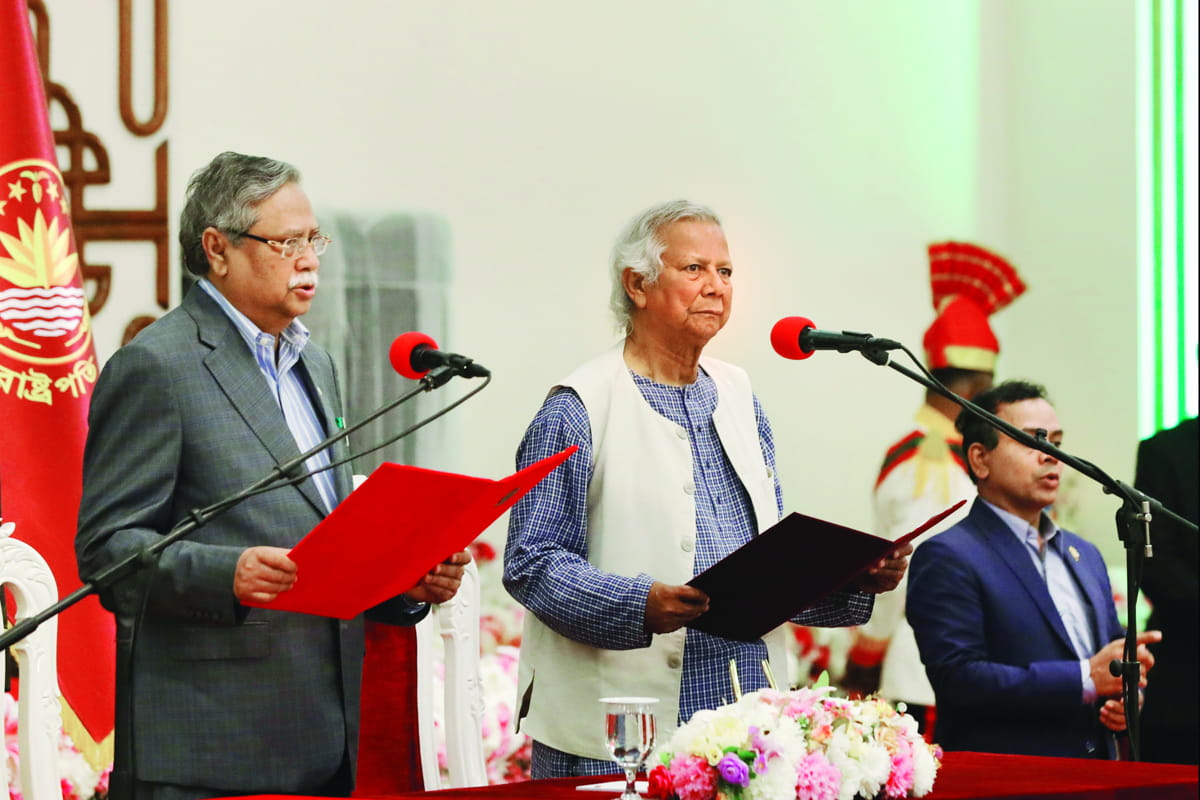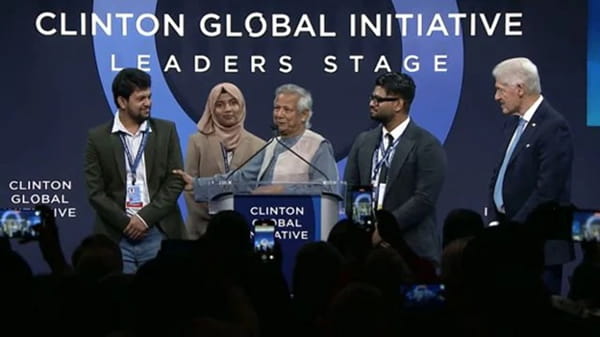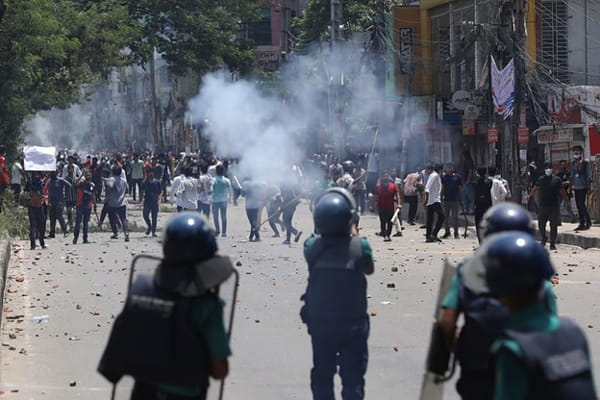
Bangladesh’s President Mohammed Shahabuddin (left) administers the oath of office to Muhammad Yunus (right), as the head of Bangladesh’s interim government in Dhaka, Bangladesh on Thursday, 8th August, 2024. | AP Photo/Rajib Dhar.
Most political parties including the Bangladesh Nationalist Party and the international community wanted quick and inclusive elections. Yet, Yunus delivered the final nail in his political coffin in a Davos podcast with Giedon Rachman, where he revealed that he had advised students to form a political party. This confirmed that he was buildig a "King's Party": completely destroying his neutrality and costing him the support of all anti-Sheikh Hasina factions.
Introduction
On August 5, when the name of Muhammad Yunus was announced as the Chief Advisor to the President following a meeting at Bangabhaban initiated by the Army Chief, an Awami League leader was among those who called. The leader remarked, “Whatever we said or did to Yunus during our time in power is a different matter, but at this moment, he is the most popular person in Bangladesh. His popularity must be close to 90% now.”
A few hours later, I went to buy medicine at a large pharmacy where more than ten salesmen were working. From their conversations, I could tell that the majority of them also believed Muhammad Yunus was the right person to lead after Sheikh Hasina’s sudden departure from the country.
Even when the country’s law and order situation rapidly deteriorated and a series of unexpected incidents took place, people placed their trust in the Army Chief and Muhammad Yunus. Many even believed that things would be set right once Yunus returned.
Early Signs
However, despite this overwhelming support, a small yet influential section of the population—those with geopolitical awareness—began to express concern even before Yunus formally took office. This was triggered by an interview he gave to the media while in Paris. In that interview, he stated, “If attempts are made to destabilize Bangladesh, then India’s Seven Sisters (the seven northeastern states) will not remain stable either.”
When this statement was widely circulated in the media, a highly-experienced and wise former diplomat called me (this was before the culture of fear regarding phone conversations took hold) and asked, “Why would someone as educated as Yunus make such a statement about our largest neighboring country, with which we share only a 207-kilometer land border, while the rest of our land borders are with another country?”
I responded by saying that due to professional reasons, I had known Yunus for a long time. In one of my writings, I had even compared some of his thoughts in his essay Remove the Barriers on the Path to those of Subhash Chandra Bose and Mahatma Gandhi. His core belief seemed to be that the state should not be all-encompassing or aggressive but should instead serve as a facilitator for the progress of its people. Personally, I share this belief: I think the more space a state allows for society, the stronger it becomes.
At that time, Yunus once called me and said, “Don’t you think you’ve written a bit too much about me?” Given this, I found it difficult to reconcile his current statements. However, I suspect that he was deeply angered by India’s decision to provide shelter to his identified enemy, Sheikh Hasina, and this anger led him to make that statement.
The senior diplomat on the phone told me, “At our age, does it make sense to be so consumed by anger? And Yunus is even older than us. Besides, India was bound to provide shelter to Sheikh Hasina. That does not mean India’s Bangladesh policy will remain the same in all aspects. India sheltered Tibet’s leader, the Dalai Lama, yet it neither acted aggressively towards China nor engaged in unnecessary conflicts with it. Similarly in 1971, India sheltered Awami League leaders and refugees and supported Bangladesh’s democratic and independence struggle but did not invade Pakistan until Pakistan attacked first. Even after victory, India made no attempt to stay in Bangladesh as an occupying force. Yunus should have understood all this. Why is he so eager to portray India as an enemy state?”
Several other senior diplomats and professors of International Relations discussed the matter with me over the phone. At that time, most people were confined to their homes due to the ongoing unrest and the telephone was the only means of exchanging views. After speaking with them, I realized that even before taking his oath, Yunus had already caused concern among a section of the population—however small their numbers may be—their thoughts hold significant influence in society.
Immediately after Yunus made that statement, discussions about the Seven Sisters and the Chicken’s Neck region erupted, flooding the discourse with thousands of words. It became evident that an old and deeply entrenched narrative—anti-India and anti-Hindu politics dating back to Pakistan’s time—was being revived and repackaged. But why did Muhammad Yunus stoke this sentiment? I could not quite understand it because this type of politics is purely electoral and has nothing to do with governing a state.
His task should have been to ensure good governance and promptly organize an inclusive election that would be recognized worldwide, something that had not happened under the Awami League government since the five city corporation elections in 2014. Moreover, Yunus had no personal stake in electoral politics. He should have known that hostility towards a neighboring country or opposition to religious minorities is only a campaign strategy, not a governing principle. Even Khaleda Zia had said as much in 2014.
Back then when the BJP was making strong anti-Muslim and anti-Bangladesh remarks in its election campaign, the BNP assumed that as in 2001, the BJP would support them over the Awami League. They kept making statements in support of the BJP. During that period, a journalist asked Khaleda Zia how the BNP planned to maintain friendly ties with the BJP if it came to power, given its hostility toward Indian Muslims and Bangladesh. Being an experienced and pragmatic leader, she responded concisely, saying, “Statements made on the campaign trail to win elections do not influence governance.”
On the other hand, Yunus failed to notice that when BNP leader Rizvi Ahmed impulsively burned a shawl and a sari in protest, not only did he stop there, but his party also refused to endorse his actions. Khaleda Zia and Mirza Fakhrul Islam Alamgir showed no interest in an anti-India narrative or in the so-called legend of the Seven Sisters. Instead, they took a different stance. Even BNP leaders, indirectly, placed a question mark over Yunus.
Later, after taking his oath under the President, Yunus made statements regarding the arson attack on Bangabandhu’s historic House No. 32, the vandalism of Sheikh Mujibur Rahman’s statue and attacks on minorities. His remarks suggested that these events were merely part of a “revolutionary celebration.” For a well-educated person like Yunus to make such comments—or to fail to take action—distanced him from at least ten million people.
Views on Minorities and the August 2024 Movement
From a religious perspective, if one divides Bengalis into Hindus and Muslims, Bengali Hindus regard figures like Michael Madhusudan Dutt, Raja Ram Mohan Roy, Rabindranath Tagore, Chittaranjan Das (C.R. Das), and Subhas Bose as intellectual and heroic icons. On the other hand, Bengali Muslims hold Kazi Nazrul Islam and Sheikh Mujibur Rahman in the same regard. (Although, in reality, all conscientious Bengalis transcend religious boundaries and accept all these figures as their intellectual and heroic inspirations.) Thus, Yunus’s indirect disregard for Bangabandhu raised questions in the minds of at least ten million people.
When he later removed August 15—the anniversary of Sheikh Mujib’s brutal assassination—from the list of national days of mourning, he further alienated a significant portion of the population.
Additionally, when Yunus initially dismissed the attacks on minorities, particularly Hindus, as mere political events rather than criminal offenses, it sent a clear message to two crore Hindus: “The one who cheats me is not necessarily smarter than me; I am just helpless, and he is exploiting that.” Someone who is made to feel helpless will never be a supporter or admirer. Quietly, another 20 million people withdrew their trust and support for Yunus.
Later, following a visit from Indian Foreign Secretary Vikram Misri, Yunus’s press secretary admitted to the media that some incidents had occurred and that investigations were ongoing. But two days before I wrote this piece, Yunus officially stated that police investigations found these incidents to be political in nature. After this remark, the silent withdrawal of support among Hindus deepened even further.

Muhammad Yunus delivering his remarks at the Clinton Global Initiative on the sidelines of the United Nations General Assembly
Later, at the United Nations, Muhammad Yunus attended a discussion hosted by the Clinton Center as a donor. During the event, he presented a young member of an extremist religious group as the meticulous designer of the anti-Sheikh Hasina movement—a movement that, until then, had been widely recognized as a protest of the general public. This individual had consistently demonstrated through his speeches and actions that he was merely a different version of the leftist school students from the 1980s—those who, despite limited knowledge, blindly believed in socialism. However, this young man’s beliefs were rooted in a different ideology and position. Under no circumstances could he be placed within a hundred miles of the knowledge and experience possessed by the student leaders of Dhaka University from the 1940s to the 1980s.
Nevertheless, the ignorance or knowledge of that young man was not the main issue. Yunus’s statement at the Clinton Center fundamentally shifted the perception of the 2024 movement. Until then, the protests had been recognized as a movement of general students and ordinary citizens but Yunus’s remarks positioned it as part of an extremist faction’s meticulously-designed strategy to overthrow Sheikh Hasina. By doing so, he alienated the very people who had taken to the streets: the common students, activists from various political parties (especially progressive and center-right groups), working-class individuals, middle-class citizens and office clerks.
As an NGO entrepreneur, Yunus had little use for Rabindranath Tagore—if anything—he saw Tagore’s principles as an obstacle to his work. At that moment, it would have benefited Yunus to reflect on Rabindranath’s wisdom. The constant pursuit of personal glorification is always a mistake. And it was from such mistaken thinking that he mischaracterized the 2024 anti-quota and anti-government movement as a fundamentalist uprising. In doing so, he not only dismissed the contributions of general students, the common people and other political groups involved in the protests but also deeply hurt a vast segment of the population. This naturally raises the question: how many of these disillusioned individuals continue to place their trust and respect in Yunus?
While still in the United States, Yunus gave an interview to Voice of America where he pressed the so-called “reset button” and erased the Liberation War of 1971, replacing it with 2024. As an NGO leader and businessman, perhaps he never had the time or the need to delve into the depths of Bangladesh’s Liberation War. However, those who have explored its history know that since the 1940s, Dhaka University had been the center of an intellectual renaissance for the Bengali Muslims of East Bengal. This movement was not solely about a land-based nationalism or even a language movement but was also driven by an intense desire to break free from deep-seated inferiority complexes through self-sacrifice.
Bengali Muslims had gained Pakistan without any sacrifice, while Bengali Hindus had a legacy of struggle: from Rishi Aurobindo’s revolutionary era that inspired Khudiram Bose, to Surya Sen’s legendary three-day resistance in Chittagong, to Binoy, Badal and Dinesh’s battles, Pritilata Waddedar’s lone fight and ultimate sacrifice, and Bagha Jatin’s Balasore battle. Added to this were Chittaranjan Das’s efforts to unite Bengali Hindus and Muslims and Subhas Chandra Bose’s epic journey toward independence, marked by his famous words: “Give me blood, and I will give you freedom.”
Even if this vast history was not erased, it was matched by the 22-year struggle of the young men of East Bengal, who erupted like a volcano with the words:
“When we have learned to die, no one can suppress us.”
“This time, the struggle is for our independence.”
Many members of Crack Platoon are still alive today. If Yunus had met them in the official residence, Jamuna Guest House, and listened closely, he would have heard their chests swell with the same pride and self-sacrifice that once burned in the hearts of Surya Sen, Ganesh Ghosh, Swadesh Ranjan Bose and Bagha Jatin. By attempting to erase the 22-year struggle and the Liberation War of 1971 with the press of a “reset button,” Yunus struck at the deeply-held pride of millions of Bengalis.
At this difficult moment, no one openly protested but many quietly distanced themselves from him. Their numbers easily exceeded ten million, perhaps even more.
Indemnity for Police Killings: A Fatal Mistake
Furthermore, Yunus granted indemnity to those involved in the killings of police officers, effectively legitimizing the murder of law enforcement personnel. His reasoning was that the police had fired on orders from Sheikh Hasina, and thus, they were “Hasina’s police.”
He also introduced abrupt and radical changes to the bureaucracy under this same flawed logic. However, had he looked back at history, he would have realized that the police force has always served the state: whoever was in power used them accordingly.
● Under Ershad’s rule, police fired on BNP rallies and killed protesters in December 1990.
● The same police force, under Khaleda Zia’s government in 1991, fired tear gas and bullets to break up the first meeting of Ershad’s Jatiya Party.
● When the Awami League came to power in 1996, the same police cracked down on BNP’s Paltan rally.
● After the BNP returned in 2001, police violently assaulted Matia Chowdhury, Tofail Ahmed and Rashed Khan Menon in the streets.

Students and riot police clash during a protest against a quota system for government jobs, in Dhaka, Bangladesh, on 18th July 2024. | AP.
The pattern is clear: police serve the state and different governments use them as needed. Therefore, attempting to assign political labels to the police or the civil bureaucracy is misguided. By blocking the legal process for the murder of police officers, Yunus did not just alienate hundreds of thousands of police officers—but also their families, whose numbers, when counted, would be in the millions. The same goes for the bureaucracy, which has now placed a question mark over Yunus himself.
And for those who still remember Shamsur Rahman’s famous poem from the Ershad era—“Your love is as false as a government press note”—they might now revise it slightly: “Your love is as false as the statements of a dustbin press secretary.” From her decades of political experience, it is clear that Yunus had essentially begun making election-style statements about India before even assuming power, which quickly raised doubts among thoughtful individuals who had previously held him in high regard.
Misjudging the Political Landscape
Yunus also made the mistake of equating Sheikh Hasina’s refusal to hold inclusive elections with the entire Awami League. Since he spent most of his time with foreign donors, he likely had little understanding of Bangladesh’s political and social landscape. He failed to recognize that the Awami League is not just a political party but is embedded in the very fabric of Bengali identity, with Sheikh Mujibur Rahman as its enduring symbol.
This explains why Abdur Razzak after 1975 and Sheikh Hasina after 1981 emerged as key figures but they were never permanent. The true essence of the party was reflected in the poet Rafique Azad’s words: “One cannot become a true Awami Leaguer by conversion; you have to be born into it.”
Therefore, trying to suppress a party that produces generationally-loyal members was a misstep, one that Ziaur Rahman and Ershad never made. By acknowledging this, they were able to gain a degree of stability and public support. Yunus, however, has failed to do so, which is why he has been unable to stabilize the country.
Losing Business and Economic Confidence
Over the past thirty years, Bangladesh’s most significant stakeholders have become businessmen and industrialists. Yunus failed to provide them with stability, leading to factories being burnt and businesses shutting down. This not only alienated business owners but also millions of workers and their families, causing another major withdrawal of support.
Furthermore, his interview with the Financial Times alarmed business leaders when he stated that he “does not believe in GDP-driven economic growth.” At 86 years old, one might pray for his longevity, but he must acknowledge that capitalism has evolved into a dominant global structure. Trying to alter it single-handedly is akin to attempting to move the Himalayas with bare hands: an impractical idea that only increased skepticism about his leadership.
The Final Blow: The King’s Party Announcement
Most political parties including the BNP and the international community wanted quick and inclusive elections. Yet, Yunus delivered the final nail in his political coffin in a Davos podcast with Gideon Rachman, where he revealed that he had advised students to form a political party. This confirmed that he was building a “King’s Party”: completely destroying his neutrality and costing him the support of all anti-Sheikh Hasina factions.
So, how many of Haradhon’schildren are still standing with Yunus now?
(The article was originally published in Sarakhonand is reproduced with permission)